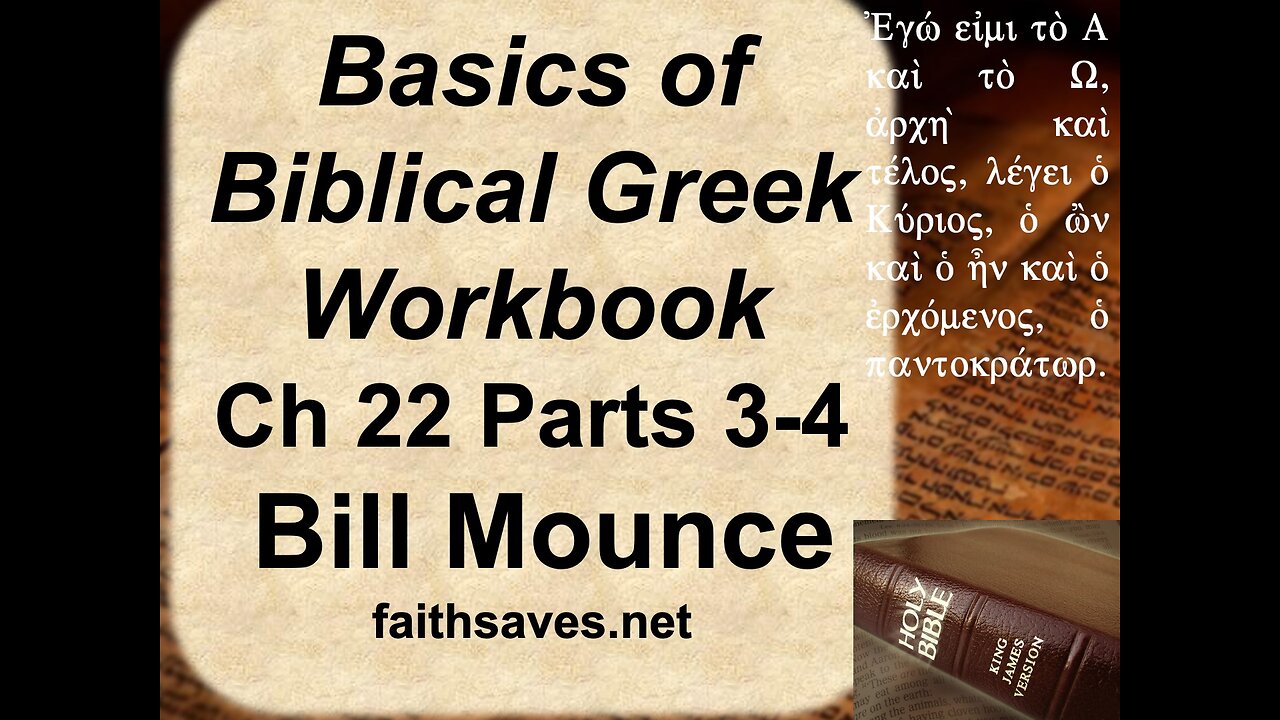Premium Only Content

New Testament / Koine Greek 30: Basics of Biblical Greek Workbook Ch 22 part 3-4: 2nd Aorist, Mounce
Lecture 30 in New Testament or Koine Greek completes chapter 22 of William (Bill) Mounce’s Basics of Biblical Greek Workbook, the second aorist indicative verb. The lecturer is independent Baptist professor Thomas Ross. Both William D. Mounce, Basics of Biblical Greek (Workbook), ed. Verlyn D. Verbrugge, Third Edition. (Grand Rapids, MI: Zondervan, 2009) or William D. Mounce, Basics of Biblical Greek Workbook, Fourth Edition (Grand Rapids: Zondervan, 2019) are acceptable for this class.
In chapter 22 of Basics of Biblical Greek (either the 3rd or the 4th edition) students learn the 2nd aorist indicative. The 2nd aorist stem tends to be exactly the same or very close in form to the root of the verb. The aorist indicates an undefined, snapshot, or summary action usually occurring in the past. This video covers the second half of Basics of Biblical Greek Workbook for chapter 22, translation exercises 9-20 (the regular translation exercises and the additional, more challenging exercises).
In addition to some sentences composed by Mounce himself, some or all of the following texts are translated:
9. Romans 6:2
10. John 6:26
11. (Mounce sentence)
12. (Mounce sentence)
13. 1 Chronicles 10:6 (LXX)
14. Genesis 7:7 (LXX)
15.1 Clement 49:6
16. John 12:1
17. John 1:10
18. John 3:22
19. John 4:18
20. John 8:52
Does Romans 6 teach that “we ought not to continue to live in sin, but we might,” or “we certainly will not continue to live in sin”? Also, in what senses are believers dead to sin? Furthermore, is "God forbid" (KJV, Romans 6:2) a mistranslation of μη γενοιτο? These questions are examined and answered exegetically.
In relation to John 6:26, the class notes that Christ did not attract people to follow Him with the things of this world. Bread was not sinful—there is nothing wrong with giving someone some bread. Nevertheless, Christ refused to keep crowds coming through giving them things, even things that were not sinful. We should represent Christ as glorious in church, and then any people who want Jesus Christ will be attracted to the church building. We should not attract the lost who do not want Jesus Christ or His glory with bread, as in John 6, or with toys, candy, circuses, special days to celebrate people in particular jobs and professions, etc., unless we see specific warrant for this in the New Testament.
In association wtih the translation of 1 Clement 49:6, the class notes that Clement was the third pastor of the Christian church at Rome. Clement wrote c. A. D. 64-70. His letter, written to the church at Corinth, taught justification by faith alone apart from works:
[Old Testament Israelites] were all glorified and magnified, not through themselves or their own works or the good deeds which they did, but through His will. 4 And we also, having been called through His will in Christ Jesus, are not justified by ourselves, or by our own wisdom or understanding or piety or the works we have done in holiness of heart, but through the faith, by which the Almighty God has justified all men from the beginning; to whom be glory for all ages. Amen.
Furthermore, 1 Clement indicates the existence of congregational, not hierarchical, church polity; the elder (πρεσβυτερος) and overseer/bishop (επισκοπος) filled the same office; the local congregation had power to appoint and remove its leaders; the church at Rome had no dominion over the church at Corinth; and the “body of Christ” was the local, visible congregation, not something universal. While Roman Catholicism claims Clement was the third Pope, he looks much more like an independent Baptist than a Roman Catholic.
-
 LIVE
LIVE
The Mel K Show
1 hour agoMORNINGS WITH MEL K - Starving the Globalist Funded Color Revolution in America 8-25-25
604 watching -
 LIVE
LIVE
The Shannon Joy Show
2 hours ago🔥🔥Stressflation Incoming - Coffee Up 25% Veggies Up 40% As Trumps Tariff Taxes Detonate On American Families.🔥🔥
167 watching -
 LIVE
LIVE
LFA TV
17 hours agoLFA TV ALL DAY STREAM - MONDAY 8/25/25
4,776 watching -
 UPCOMING
UPCOMING
Grant Stinchfield
3 days agoDemocrats Try to Turn California Into Predator Playground with Proposed "Child Predator Dream Bill"
1.1K -
 1:01:13
1:01:13
VINCE
3 hours agoWhy Does This Mayor Enjoy Watching His City Burn? | Episode 110 - 08/25/25
130K91 -
 2:59:41
2:59:41
Wendy Bell Radio
7 hours agoAGENTS OF DECEPTION
40.4K105 -
 LIVE
LIVE
Major League Fishing
3 days agoLIVE! - Fishing Clash Team Series: Challenge Cup - Day 2
143 watching -
 1:19:04
1:19:04
The Big Mig™
4 hours agoTop 10 GO WOKE GO BROKE
4.11K12 -
 LIVE
LIVE
Law&Crime
3 hours ago $0.69 earnedLIVE: Adelson Matriarch Murder Trial — FL v. Donna Adelson — Day 1
148 watching -
 LIVE
LIVE
JuicyJohns
4 hours ago $1.27 earned🟢#1 REBIRTH PLAYER 10.2+ KD🟢
78 watching